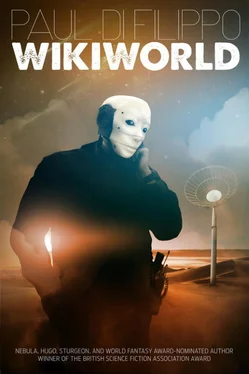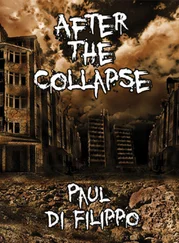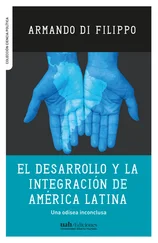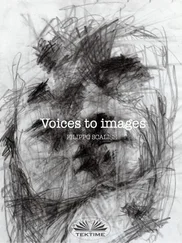Paul Di Filippo - WikiWorld
Здесь есть возможность читать онлайн «Paul Di Filippo - WikiWorld» весь текст электронной книги совершенно бесплатно (целиком полную версию без сокращений). В некоторых случаях можно слушать аудио, скачать через торрент в формате fb2 и присутствует краткое содержание. Город: Toronto, Год выпуска: 2013, ISBN: 2013, Издательство: ChiZine Publications, Жанр: Фантастика и фэнтези, на английском языке. Описание произведения, (предисловие) а так же отзывы посетителей доступны на портале библиотеки ЛибКат.
- Название:WikiWorld
- Автор:
- Издательство:ChiZine Publications
- Жанр:
- Год:2013
- Город:Toronto
- ISBN:978-1771481557
- Рейтинг книги:4 / 5. Голосов: 1
-
Избранное:Добавить в избранное
- Отзывы:
-
Ваша оценка:
- 80
- 1
- 2
- 3
- 4
- 5
WikiWorld: краткое содержание, описание и аннотация
Предлагаем к чтению аннотацию, описание, краткое содержание или предисловие (зависит от того, что написал сам автор книги «WikiWorld»). Если вы не нашли необходимую информацию о книге — напишите в комментариях, мы постараемся отыскать её.
WikiWorld — читать онлайн бесплатно полную книгу (весь текст) целиком
Ниже представлен текст книги, разбитый по страницам. Система сохранения места последней прочитанной страницы, позволяет с удобством читать онлайн бесплатно книгу «WikiWorld», без необходимости каждый раз заново искать на чём Вы остановились. Поставьте закладку, и сможете в любой момент перейти на страницу, на которой закончили чтение.
Интервал:
Закладка:
“Witness the glories of the Tremont House, ladies. The first hotel ever to incorporate running water, and thus a fit establishment to temporarily host Professor Fluvius and his Naiads during the early portion of our Boston stay!”
The professor seemed intent on advertising himself and us, and it was at this juncture that I began to apprehend that I had become, willy-nilly, part of a commercial venture of some sort.
We exited the hotel through its grand colonnaded entrance on Tremont Street and crossed a miry sidewalk and concourse, nimbly dodging carriages and carts.
Amazingly, I found myself stepping unerringly on an irregular trail of clean patches amidst the offal and manure, thus succeeding in keeping my bare feet unsullied. I noticed that my sisters trod a similar random series of sterile stepping stones.
Or was it that the uniformly dirty pavement spontaneously developed virginal patches beneath our feet?
As we seven attractive women and pavonine man hiked determinedly through the streets of Boston, we began to attract a crowd of followers, picaroons and mudlarks mostly, whose unsolicited comments veered more toward gibes and lewd offerings of unwanted intimate services than had those of the Tremont House crowd. But I and my dignified sisters ignored the verbal affronts from the swelling ranks of our entourage, and Professor Fluvius seemed actually to relish their attentions.
“That’s it, lads, that’s it! Roll up, roll up! Follow us for the most exciting news of the decade!”
Almost immediately after leaving the hotel, we found ourselves in a park full of greenery, and were able to indulge our bare feet on grass. But this respite was short-lived, as we soon exited the Public Gardens and proceeded uptown on a street labelled Boylston.
My eye was drawn to a posted bill advertising a new play— The Children of Oceanus , by Eleuthera Stayrook—at the Everett Hall Theatre, and bearing the commencement date of July 12th, 1877.
And so it was that I had my first inkling of what year it was in which I had awakened—assuming the poster to be of recent vintage, an assumption which its unweathered appearance supported.
Reaching a cross-street named Clarendon, we turned and encountered a construction site. Here, a vast project sprawling across several blocks was in its obvious end stages.
The building at the centre of the site was a church of soaring magnificence. Not as large as a cathedral, the brown-hued sanctuary nonetheless radiated a deep gravitas counterbalanced by an exuberant sense of joy.
Workmen swarmed around the nearly complete structure, taking down scaffolding, entering the interior with loads of fine materials, sweeping up debris. One man seemed in charge of the general organized hubbub, and it was toward him that Professor Fluvius made a beeline.
At my side, the woman introduced to me as Plaxie now spoke in a stage-whisper, leaning her pert-nosed, black-ringleted head close to my own auburn locks. Her breath smelled mildly of fish.
“If you think you’ve seen the Prof put on a show so far, just wait till he gets to work on this mark!”
We now—my comrades, and the raggle-taggle flock that had attached itself to us—came to a stop around the overseer. He was a plump gent with a thick chestnut beard, hair parted down the middle, and an intelligently playful twinkle to his eyes that offset his otherwise stern demeanour. He wore an expensive brown suit.
Professor Fluvius hailed him in a loud voice more suited to the baseball outfield than face-to-face conversation, and I could tell he was playing to the crowd.
“You, good sir, are Henry Hobson Richardson, the veritable visionary architect of this grand dream in rough stone we see before us!”
Richardson seemed more amused than perturbed. “Yes, sir, I am. And may I enquire your name and purpose?”
“I am Professor Nodens Fluvius, and I am here to give you your next commission!”
“Indeed? And what might that be?”
“A public bath house!”
Loud guffaws and taunts arose from the spectators, but Fluvius remained unperturbed, and Richardson continued to express some unfeigned interest at this odd commission.
“A public bath house, Professor Fluvius? I assume you are thinking along the lines of the municipal facilities found on the Continent. But are you unaware of the spectacular failure of the Mott Street Bath House in New York City, some twenty years ago? Since then, no private investor nor any municipality in our great nation has deemed such an enterprise feasible. Nor has the public clamoured for such facilities.”
“Ah, but that is because all businessmen and politicos have lacked my farsighted conception of what such an establishment could offer. And as for the public—they know not what they want till it is presented to them.”
At this point, the professor encompassed us seven maidens with a sweep of his arm, as if to indicate that we would appear uppermost on his bill of fare. Some of my sisters lowered their glances demurely, but I maintained a bold gaze directed at the hoi polloi, even when raucous huzzahs went up from the crowd. For a moment, I wondered with alarm if we were meant to be courtesans in this hypothetical establishment. But then I recalled the clean organic thrill of the liquid energies that had flowed from the professor’s touch, and felt reassured of his honest intentions toward us.
“Moreover,” continued the professor, “no prior entrepreneur has held a doctorate in hydrostatics from La Sapienza University in Rome, as do I. Surely you know of the marvellous accomplishments of the ancient Romans in this sphere… ? Well, the ultra-modern technics of boilers, valves, conduits, gravity-fed reservoirs and suchlike that I intend to install will make the Baths of Caracalla look like a roadside ditch!”
At the mention of a technological challenge, the architect Richardson developed an even keener expression. “Speak on, Professor.”
“I have conceived of a palatial public bathhouse that will employ the latest in hydropathic techniques to promote robust health and invigoration in all its patrons. Combining methodologies I learned at first hand from Vincenz Priessnitz himself at Grafenburg with subtle refinements of my own devising, I can guarantee to reform drunkards, cure the halt and lame, invigorate the intellect of scholars and schoolboys alike, and induce passion in sterile marriages—all for mere pennies a visit!”
This last boast raised further hoots and japes from the crowd, who nonetheless, I sensed, evinced real interest on some deep level at the professor’s pitch. Richardson, meanwhile, seemed to be cogitating seriously on the proposal as well, unconsciously rubbing his sizeable vest-swathed tummy as an aid to cogitation.
Grinning, Professor Fluvius awaited the architect’s response—which finally came in the form of a question.
“How is this ambitious project to be funded, Professor? I do not work in anticipation of a portion of future profits.”
“All is assured, Mister Richardson. I assume pure alluvial gold would be deemed legal tender… ?”
The professor removed a cowhide poke from a suit pocket. Uncinching the poke’s neck, he grabbed Richardson’s hand and poured a mound of glittering golden grit into his cupped palm. Richardson’s eyes expanded to their full diameter. Professor Fluvius dropped the poke atop the mound and said, “Consider this your retainer, I pray, good sir.”
Very carefully, Richardson poured the gold back into the poke and deposited the pouch in his own suit. “Professor Fluvius, you have your architect.”
A roar of acclaim went up from the crowd. I realized that their massed attention had been part of the professor’s sly plan to add public pressure to compel Richardson’s assent. Surely by tomorrow this commission would be spread across all the newspapers of Boston.
Читать дальшеИнтервал:
Закладка:
Похожие книги на «WikiWorld»
Представляем Вашему вниманию похожие книги на «WikiWorld» списком для выбора. Мы отобрали схожую по названию и смыслу литературу в надежде предоставить читателям больше вариантов отыскать новые, интересные, ещё непрочитанные произведения.
Обсуждение, отзывы о книге «WikiWorld» и просто собственные мнения читателей. Оставьте ваши комментарии, напишите, что Вы думаете о произведении, его смысле или главных героях. Укажите что конкретно понравилось, а что нет, и почему Вы так считаете.










